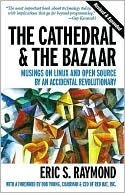More on this book
Community
Kindle Notes & Highlights
Read between
September 25, 2020 - January 21, 2021
The brutal truth is this: when your key business processes are executed by opaque blocks of bits that you can’t even see inside (let alone modify) you have lost control of your business.
“wake me when it’s over” management style in “Peopleware: Productive Projects and Teams
In a latter-day take on John Gilmore’s famous observation that the Internet interprets censorship as damage and routes around it, it has been aptly said that the hacker community responsible for Linux interprets attempts at control as damage and routes around them.
(Databases, for example, became middleware after SQL decoupled front ends from engines.)
While this is hardly happy news for entrepreneurs who would like to collect rent on closed software forever, it does suggest that the software industry as a whole will remain entrepreneurial, with new niches constantly opening up at the upper (application) end and a limited lifespan for closed-IP monopolies as their product categories fall into infrastructure.
Former KGB chief Oleg Kalugin puts the case well (http://cnn.com/SPECIALS/cold.war/experience/spies/interviews/kalugin/): For instance, when we stole IBMs in our blueprints, or some other electronic areas which the West made great strides in and we were behind, it would take years to implement the results of our intelligence
And they asked me how I did it, and I gave ‘em the Scripture text, “You keep your light so shining a little in front o’ the next!” They copied all they could follow, but they couldn’t copy my mind, And I left ‘em sweating and stealing a year and a half behind.
Keeping your driver secret looks attractive in the short run, but is probably bad strategy in the long run (certainly when you’re competing with other vendors that are already open).
I had not the faintest idea that my amateur anthropologizing could itself become a significant catalyst for change.
The Mythical Man-Month
The real conceptual breakthrough, though, was admitting to ourselves that what we needed to mount was in effect a marketing campaign — and that it would require marketing techniques (spin, image-building, and rebranding) to make it work.
One of the things that seemed clearest was that the historical Unix strategy of bottom-up evangelism (relying on engineers to persuade their bosses by rational argument) had been a failure. This was naive and easily trumped by Microsoft. Further, the Netscape breakthrough didn’t happen that way. It happened because a strategic decision-maker (Jim Barksdale) got the clue and then imposed that vision on the people below him.
It would be insufficient to have one or a handful of ambassadors speaking effective language if, at the grass roots, most hackers were making arguments that didn’t work.
“May the Source be with you!”
Open source,” in Jamie’s now-famous words, “is [great, but it’s] not magic pixie dust.”
secrecy, of centralization, and of certain kinds of intellectual property.
music and most books are not like software, because they don’t generally need to be debugged or maintained.
There is another group of people who loudly call themselves hackers, but aren’t. These are people (mainly adolescent males) who get a kick out of breaking into computers and phreaking the phone system. Real hackers call these people “crackers” and want nothing to do with them.
if you think of cultivating hacker attitudes as just a way to gain acceptance in the culture, you’ll miss the point.
The world is full of fascinating problems waiting to be solved.
Nobody should ever have to solve a problem twice.
Boredom and drudgery are evil.
is one apparent exception to this. Hackers will sometimes do things that may seem repetitive or boring to an observer as a mind-clearing exercise, or in order to acquire a skill or have some particular kind of experience you can’t have otherwise. But this is by choice — nobody who can think should ever be forced into a situation that bores them.)
Freedom is good.
Attitude is no substitute for competence.
Learn how to program.
have to learn C,
LISP is worth learning for the profound enlightenment experience you will have when you finally get it;
(Python, Java, C/C++, Perl, and LISP).
reading code and (b) writing code.
Get one of the open-source Unixes and learn to use and run it.
get a copy of Linux or one of the BSD-Unixes, install it on a personal machine, and run it.
like trying to learn to dance while wearing a body cast.
Write open-source software
Help test and debug open-source software
Publish useful information
Help keep the infrastructure working
Serve the hacker culture itself
HTML: The Definitive Guide, http://www.oreilly.com/catalog/html3/.
for accountants: the argument that service costs will eventually swamp a fixed up-front price still works if we move from constant dollars to discounted present value, because future sale revenue discounts in parallel with future service costs.


